The spectacle of the Prigozhin rebellion—including the nearly unopposed Wagner Group march almost to Moscow—is a sign that Putin’s regime is weakened. Now is the time to redouble pressure and hold accountable Putin and his cronies for their aggression against Ukraine and effort to undermine global democracy. Financial sanctions are a critical part of that full-court press. With that in mind, we are pleased to publish the latest edition of our Brookings Sanctions Tracker. Approaching 5,000 targeted financial sanctions listings in nine jurisdictions, this update includes the addition of almost 2,000 entries. Sanctioned individuals include Putin, Russian government and military officials associated with him, and favored oligarchs. Mapping the sanctions imposed highlights the scope of Putin’s network as well as potential pressure points to counter the regime.
The recent Wagner rebellion demonstrates the complex Russian political landscape and highlights the vulnerabilities of corrupt systems. Effective sanctions advance the global fight against corruption. The powerful scope, depth, and continuity of sanctions imposed against Russian entities and individuals is impactful. Yet, as the examples below demonstrate, loopholes persist. More must be done to close loopholes and increase pressure on Putin’s regime and sanction evaders. The Brookings Sanctions Tracker allows you to track targeted financial action against oligarchic networks in Russia and beyond. The tracker provides critical visibility and insight into both the progress to date and emerging gaps.
Notable progress has been made to expand sanctions, including the latest round of U.S. sanctions announced yesterday, that affect enablers of Russian corruption. For example, following the release of our September analysis, virtually all jurisdictions noted in the tracker have taken measurable action against the legislative bodies of the Russian Federation, sanctioning hundreds of members of the Federation Council and the State Duma. Many of these individuals have held important roles in Putin’s kleptocratic network.
Several jurisdictions have recently emphasized their commitment to targeting those attempting to circumvent sanctions. The U.S. (which has taken a leading role on Russia-related sanctions) and the EU recently announced further efforts to close sanctions loopholes. We welcome these efforts. Countering the circumvention of sanctions is an area for improvement across jurisdictions and globally, as issues like the “golden visa” system illustrate.
The tracker also highlights relationships among sanctioned individuals and entities, as well as discrepancies across jurisdictions. Two networks fueling Russia’s war in Ukraine, the Wagner Group and the chain of Iranian unmanned aerial vehicle (UAV) suppliers, are discussed in more detail below.
Wagner Group
PMC Wagner is sanctioned for human rights abuses and transnational crimes around the globe. Its signature activities have been amplified by the conflict in Ukraine, in which Wagner’s “mercenaries” were deployed to fight on behalf of the Russian state. Our database allows you to track targeted financial sanctions against the Wagner Group and its mercenary network from December 2016. We have included data on multilateral sanctions against over 25 individuals and entities linked to the Wagner Group, revealing loopholes across jurisdictions and exposing the individuals responsible for human rights abuses.
Nearly all the jurisdictions we track have sanctioned Dimitriy Valerievich Utkin, a founder of the Wagner Group, and several have sanctioned Task Force Rusich, a paramilitary organization allegedly operating as a sub-unit of Wagner Group. In this update, the tracker demonstrates a pattern of extensive third-parties linked to and allegedly operating on behalf of Wagner, replicated in another area essential to Russia’s war effort in Ukraine: Iranian UAV supply.
Iranian UAVs
While Prigohzin’s short-lived rebellion lasted only 36 hours, the cooperation fueling Iranian UAV deployment from Iran to Russia is strengthening. Russia has denied receiving and using Iranian drones, but contrary evidence shows the invasion of Ukraine has opened a window of opportunity for Tehran. The Iranian network of UAV production, from the manufacture of components to the deployment, is intricately linked through companies and individuals associated with the Islamic Revolutionary Guard Corps (IRGC) Aerospace Force, part of Iran’s armed forces connected to Russia.
The Shahed and Mohajer-series UAVs deployed by Russian armed forces in Ukraine are produced through a series of illicit networks operating out of Iran. Qods Aviation Industries (QAI), known to work with the IRGC, has been organized under the Iran Aviation Industries Organization (IAIO), an organization responsible for the management of Iran’s military aviation industry. QAI and other companies, like Paravar Pars, work alongside Shahed Aviation Industries to fuel the continued manufacture of UAVs under the direction of the Iranian government.
The Brookings Sanctions Tracker identifies the individuals heading each organization and provides a breakdown of rationales for each sanction and relationships between individuals and entities involved. This allows you to track linkages in multiple ways. By using this function, it is possible to see gaps between jurisdictions targeting individuals and entities involved with Iranian UAV supply and transfer to Russia. Identifying and filling gaps like these are critical steps to erode the supply line for the Russian war machine.
Putin’s corrupt network bleeds across sectors of the Russian economy and the world. Multilateral sanctions that target the political, economic, and financial system of the Russian Federation can help counter this network, including global partners aiding Putin’s war in Ukraine. The Brookings Sanctions Tracker reveals the scope of these targeted financial sanctions and helps analysts identify gaps within and between jurisdictions’ listings of entities and individuals.
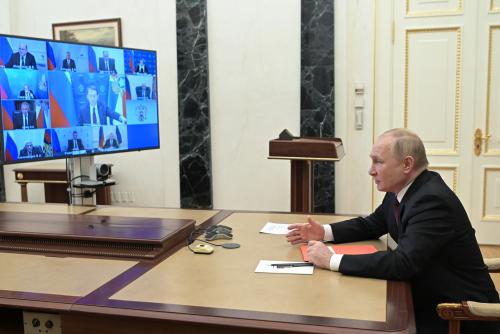
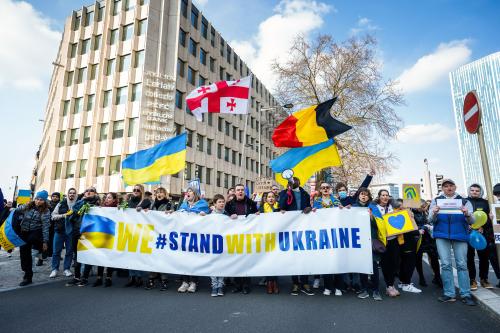
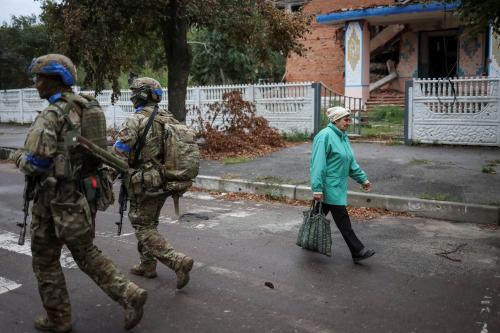




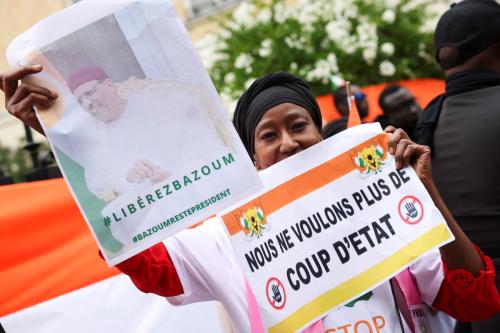
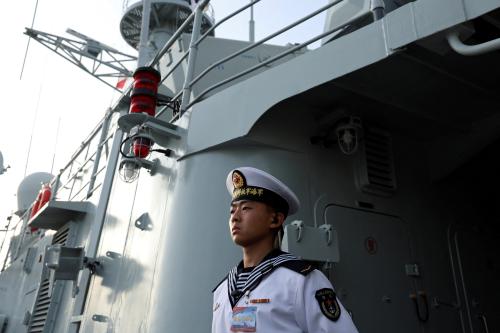
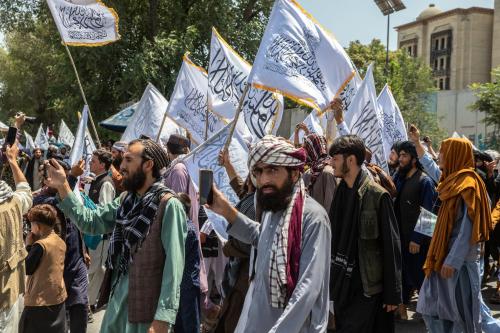
Commentary
Putin’s pressure points are showing—time to strengthen Russian sanctions
The Brookings Sanctions Tracker Sixth Edition
July 21, 2023